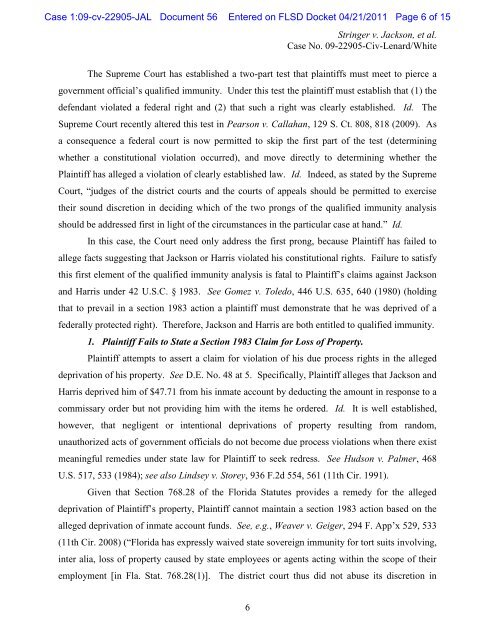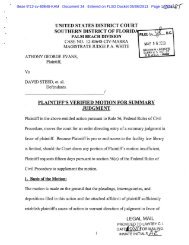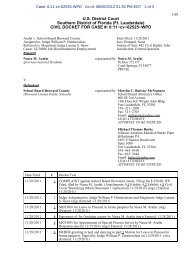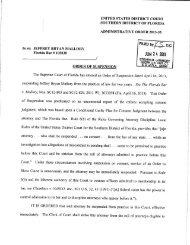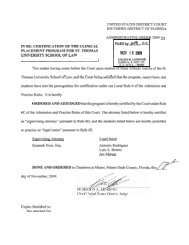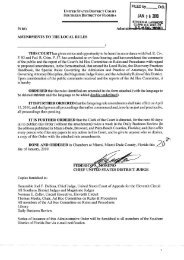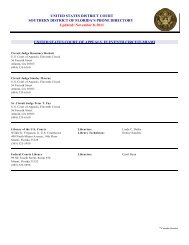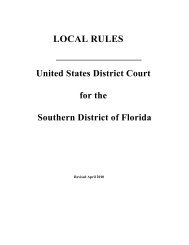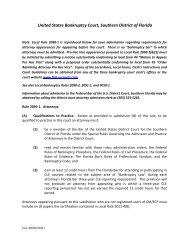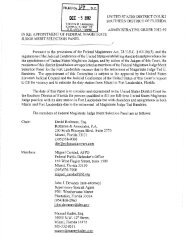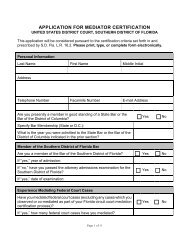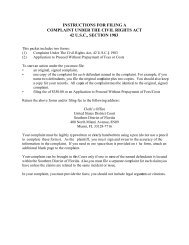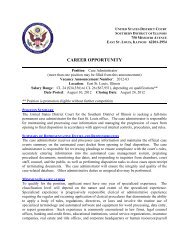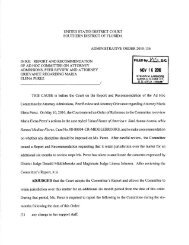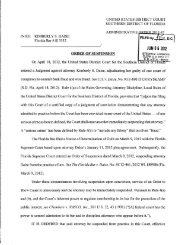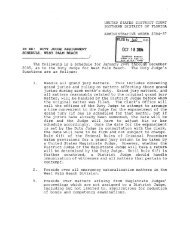US District Court Southern District of Florida (Miami) - United States ...
US District Court Southern District of Florida (Miami) - United States ...
US District Court Southern District of Florida (Miami) - United States ...
Create successful ePaper yourself
Turn your PDF publications into a flip-book with our unique Google optimized e-Paper software.
Case 1:09-cv-22905-JAL Document 56 Entered on FLSD Docket 04/21/2011 Page 6 <strong>of</strong> 15<br />
6<br />
Stringer v. Jackson, et al.<br />
Case No. 09-22905-Civ-Lenard/White<br />
The Supreme <strong>Court</strong> has established a two-part test that plaintiffs must meet to pierce a<br />
government <strong>of</strong>ficial‘s qualified immunity. Under this test the plaintiff must establish that (1) the<br />
defendant violated a federal right and (2) that such a right was clearly established. Id. The<br />
Supreme <strong>Court</strong> recently altered this test in Pearson v. Callahan, 129 S. Ct. 808, 818 (2009). As<br />
a consequence a federal court is now permitted to skip the first part <strong>of</strong> the test (determining<br />
whether a constitutional violation occurred), and move directly to determining whether the<br />
Plaintiff has alleged a violation <strong>of</strong> clearly established law. Id. Indeed, as stated by the Supreme<br />
<strong>Court</strong>, ―judges <strong>of</strong> the district courts and the courts <strong>of</strong> appeals should be permitted to exercise<br />
their sound discretion in deciding which <strong>of</strong> the two prongs <strong>of</strong> the qualified immunity analysis<br />
should be addressed first in light <strong>of</strong> the circumstances in the particular case at hand.‖ Id.<br />
In this case, the <strong>Court</strong> need only address the first prong, because Plaintiff has failed to<br />
allege facts suggesting that Jackson or Harris violated his constitutional rights. Failure to satisfy<br />
this first element <strong>of</strong> the qualified immunity analysis is fatal to Plaintiff‘s claims against Jackson<br />
and Harris under 42 U.S.C. § 1983. See Gomez v. Toledo, 446 U.S. 635, 640 (1980) (holding<br />
that to prevail in a section 1983 action a plaintiff must demonstrate that he was deprived <strong>of</strong> a<br />
federally protected right). Therefore, Jackson and Harris are both entitled to qualified immunity.<br />
1. Plaintiff Fails to State a Section 1983 Claim for Loss <strong>of</strong> Property.<br />
Plaintiff attempts to assert a claim for violation <strong>of</strong> his due process rights in the alleged<br />
deprivation <strong>of</strong> his property. See D.E. No. 48 at 5. Specifically, Plaintiff alleges that Jackson and<br />
Harris deprived him <strong>of</strong> $47.71 from his inmate account by deducting the amount in response to a<br />
commissary order but not providing him with the items he ordered. Id. It is well established,<br />
however, that negligent or intentional deprivations <strong>of</strong> property resulting from random,<br />
unauthorized acts <strong>of</strong> government <strong>of</strong>ficials do not become due process violations when there exist<br />
meaningful remedies under state law for Plaintiff to seek redress. See Hudson v. Palmer, 468<br />
U.S. 517, 533 (1984); see also Lindsey v. Storey, 936 F.2d 554, 561 (11th Cir. 1991).<br />
Given that Section 768.28 <strong>of</strong> the <strong>Florida</strong> Statutes provides a remedy for the alleged<br />
deprivation <strong>of</strong> Plaintiff‘s property, Plaintiff cannot maintain a section 1983 action based on the<br />
alleged deprivation <strong>of</strong> inmate account funds. See, e.g., Weaver v. Geiger, 294 F. App‘x 529, 533<br />
(11th Cir. 2008) (―<strong>Florida</strong> has expressly waived state sovereign immunity for tort suits involving,<br />
inter alia, loss <strong>of</strong> property caused by state employees or agents acting within the scope <strong>of</strong> their<br />
employment [in Fla. Stat. 768.28(1)]. The district court thus did not abuse its discretion in


